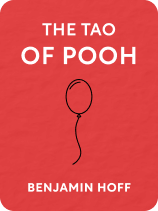

This article is an excerpt from the Shortform book guide to "The Tao of Pooh" by Benjamin Hoff. Shortform has the world's best summaries and analyses of books you should be reading.
Like this article? Sign up for a free trial here .
What is the principle of Inner Nature in Taoism? How does Inner Nature show up in The Tao of Pooh?
Inner Nature encompasses the unique aspects inside everything. You can’t ignore it and you can’t understand it by just being clever.
Keep reading to understand the principle of Inner Nature from The Tao of Pooh.
Inner Nature and Cleverness
In the world of Pooh, Rabbit represents cleverness. But as seen in the example of Pooh, Rabbit, and Piglet lost in the forest, cleverness is rarely suitable for understanding the nuances of life.
Cleverness is inadequate as a method for understanding life. It is knowledge that exists on the surface of things and can be quickly dispensed as judgments or evidence of intellectual supremacy. But life changes deeply at times, and shallow cleverness cannot always keep up. When you focus on being clever, you miss many significant aspects of life, such as your Inner Nature.
An example of the failings of cleverness is when Kanga and Roo first come to the forest. At first, Rabbit sees that they are different and dislikes them. Being clever, he devises a plan to get rid of them. But as time passes, everyone sees how much Kanga and Roo have to offer and welcomes them into the group. Rabbit’s clever plan is thwarted, and he has to readjust his initial opinion because of what their Inner Natures revealed.
Rabbit’s inaccurate judgments are reminiscent of many seen in our society. We are easily persuaded into believing that differences are only skin deep, and we concoct clever remarks or ways of separating ourselves from each other. Others become manipulated or influenced by the cleverness of others because they, too, are not looking deeper than the surface. When you ignore Inner Nature, you make it easier for lines to be drawn between yourself and others. When you accept that Inner Nature exists in all of us, cleverness takes a backseat to acceptance and understanding.
You must also turn this lens toward yourself. There are always going to be things you don’t like about who you are, but those things do not define you and are not permanent. Every part of who you are is worthwhile in the right context. Once you know who you are, you can decide what to do with it. Finding alternative uses for your unwanted characteristics is easier than ignoring them or getting rid of them.
For example, humans work hard to avoid negative emotions because they are painful and jarring. But you can always reshape negative emotions into something positive. Think of feelings like piano keys. When you pound them, you create a chaotic and disturbing noise. But removing the keys leaves you without any music at all. When you play the keys in the right configuration, you can create something beautiful.
This focus on the negative is best represented by the Eeyore Attitude. Eeyore focuses on the negative side of everything. He uses knowledge to understand what there is to complain about and cleverness to express his pessimism. For instance, when Pooh wishes Eeyore a good morning, he replies, “Good morning, Pooh Bear, if it is a good morning, which I doubt.”
You may become stuck in the Eeyore Attitude when knowledge and cleverness fail to support the results you want. Until you are open to seeing what lies beneath the surface of life, you will never understand the true nature and power of the people and world around you and, thus, will never be satisfied.

———End of Preview———
Like what you just read? Read the rest of the world's best book summary and analysis of Benjamin Hoff's "The Tao of Pooh" at Shortform .
Here's what you'll find in our full The Tao of Pooh summary :
- How Winnie-the-Pooh perfectly models the principles of Taoism
- The 6 principles of Taoism reflected in Pooh's adventures
- How to become Winnie-the-Pooh and unlock a magic inside of you






